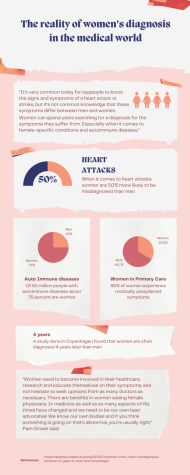
 The understanding of medicine has rapidly grown in the past few decades, yet women are often misdiagnosed to this day. This problem is evident in both mental and physical health.
The understanding of medicine has rapidly grown in the past few decades, yet women are often misdiagnosed to this day. This problem is evident in both mental and physical health.
This happens to women more often due to a knowledge gap: the lack of knowledge of how women have different symptoms and bodies. For hundreds of years, white men have always been the ones to be tested and observed. This means all the information and data doctors utilize are specifically how white men have reacted to autism, ADHD, heart attacks, and strokes in the past. Disabilities and issues in the studies are usually completely different than how women react.
Pam Cinadr, a retired PV nurse, states that “It’s very common today for laypeople to know the signs and symptoms of a heart attack or stroke, but it’s not common knowledge that these symptoms differ between men and women. Women can spend years searching for a diagnosis for the symptoms they suffer from. Especially when it comes to female-specific conditions and autoimmune diseases.”
Situations like these are flawed as men metabolize medication much quicker than females and often take a much higher dose. Yet the reason women were not part of drug testing was a worry that the drugs cause issues when pregnant. The FDA did not allow women to take part in the study.
Hope Willwerth, a former PV student, had struggled a lot with misdiagnosis during her high school years. In both mental and physical health, doctors told her she had schizophrenia, an eating disorder and sinus issues. They all turned out false once she got multiple opinions.
Willwerth expressed her frustrations with misdiagnosis, “I think some doctors don’t take the time to look further into detail and would rather diagnose someone and move on to something ‘better.’ I feel if doctors spent more time or looked at the picture as a whole so they can diagnose more accurately.”
When it comes to heart attacks, women have a 50% higher chance of being misdiagnosed than men. A study done by the University of Copenhagen found that women are diagnosed four years later on average than men. This isn’t just for a couple of illnesses; more than 700 diseases are misdiagnosed this way. For cancer, women also get diagnosed with cancer two and half years later than men.
When it comes to autoimmune diseases, about 75% of women have autoimmune diseases.
Doctors often dismiss women with unexplained pain due to not knowing what could be causing it. This also happens with mental health and can be written off as menstruation. Women of color have an even greater misdiagnosis even though they are at higher risks for things such as Alzheimers and strokes. The lack of knowledge of women’s autonomy and people of color’s differences are hindering advancements in medicine, especially for women.
Cinadr promotes women to keep pushing for their health, “Women need to become involved in their healthcare, research and educate themselves on their symptoms, and not hesitate to seek opinions from as many doctors as necessary. There are benefits in women seeing female physicians. In medicine as well as so many aspects of life, times have changed and we need to be our own best advocates! We know our own bodies and if you think something is going on that’s abnormal, you’re usually right,” she said.
Women should not have to fight to get their pain fixed. Another reason is that women are known as more mental beings than physical. Women are not taken seriously by medical health providers due to medically unexplained symptoms (MUS) which women are more prone to than men. It also has been taught in medical fields that women are more prone to psychogenic symptoms which makes doctors push back and not believe women.
Due to the mistrust and the lack of knowledge about women’s bodies, this is one of the biggest roadblocks in 21st-century medicine. Medical providers not listening, dismissing and not understanding women is a crisis that needs to be more recognized and fixed.









Caroline • Nov 3, 2022 at 3:11 pm
Good article! I agree that misdiagnosis for women is still a huge problem in the 21st century. Even just personal experience tells me that which is sad, but at least it’s getting more awareness.